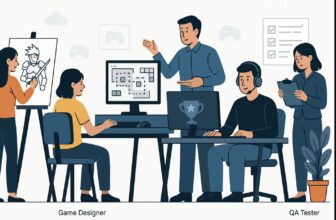In a year where AI writes code, answers customer queries, and even edits videos, it’s natural to ask, what’s left for humans? Especially in India, where career choices shape entire families, the question feels urgent. But here’s the reality: not every job is at risk.
There are dozens of professions where AI falls short. Not because it’s slow or weak, but because it lacks something essential: human judgment, physical presence, empathy, or cultural understanding.
This list isn’t about resisting the future. It’s about finding your place in it, through work that still needs people. What follows is a list of 37 roles in India that remain powered by human skill, not just software. Some are traditional, some are rising again, but all of them prove one thing: you’re still needed.
Why These Job Roles Still Need People
AI has become faster, smarter, and more useful. But it still can’t feel. It doesn’t understand emotion, make ethical choices, or deal with unpredictability in the real world. In India, where work often involves culture, relationships, and physical presence, many roles remain firmly human-first.
You’ll find that these roles rely on things machines aren’t good at:
- Making tough calls when rules don’t apply
- Comforting people in distress
- Teaching young minds
- Fixing things with your hands
- Expressing stories, traditions, and creativity
The 37 Career Choices Where AI Steps Back
To make this practical, we’ve grouped these jobs into categories based on the kind of human input they demand.
Healing Requires More Than Algorithms
1. Doctor
No AI can take full responsibility for life-and-death decisions. Diagnosis tools may help, but real doctors are still at the center.
2. Nurse
Nurses offer care that’s emotional, responsive, and deeply human, especially in Indian hospitals where families rely on them.
3. Psychologist / Psychiatrist
Mental health support needs empathy, nuance, and cultural understanding. AI can simulate, but it can’t connect like a trained professional.
4. Physiotherapist
You can’t train an AI to manually guide recovery. Touch, timing, and trust matter here.
5. Occupational Therapist
Helping someone rebuild life skills after injury or disability requires adaptation and sensitivity that only a person can provide.
6. Clinical Lab Technician
Many diagnostics are automated, but interpreting complex, uncertain cases still needs human oversight.
7. Home Health Aide
Elderly care, post-surgery support, and chronic illness management often happen in homes, not labs. This is a people-first field.
Teaching Can’t Be Fully Outsourced
8. School Teacher (Primary & Middle)
AI tools assist, but they don’t inspire. Human teachers shape behavior, build confidence, and adapt on the spot.
9. Special Educator
Supporting children with learning disabilities or behavioral needs takes patience and customization.
10. Career Coach / Counselor
Career choices involve family expectations, local realities, and personal struggles. Machines don’t know your background. People do.
11. Soft Skills Trainer
Body language, tone, and audience engagement are still very much human territory.
12. Educational Therapist
Working with students who need remedial or emotional support in studies requires attention and flexibility no AI can match.
Hands-On Roles That Stay Human
13. Electrician
No robot is visiting your flat in Delhi to fix a tripped MCB or faulty wiring anytime soon.
14. Plumber
Bathrooms, leaks, fittings, each job is different. Real-time adjustments, judgment, and physical access matter.
15. AC Technician
Repairs, installations, and part replacements are highly manual and locally varied.
16. Auto Mechanic
From scooters to tractors, India runs on wheels, and fixing them still needs people, especially outside metro cities.
17. Carpenter
Each piece of wood, every home setup, nothing standard, nothing automatable in full.
Justice Can’t Be Left to Code
18. Advocate (Litigation)
Arguing a case in court, interpreting law with cultural context, AI can suggest precedents, but not plead your case.
19. Judge
Fairness isn’t just about logic. Ethics, intention, and lived experience shape decisions in ways machines don’t grasp.
20. Legal Mediator
Disputes between families or businesses need trust-building and compromise, areas where people outperform prediction tools.
Creativity That Breaks All Patterns
21. Screenwriter (TV, Films, OTT)
AI can copy formulas. But India’s diverse stories, from Bhojpuri to Bengali, need cultural memory, not just syntax.
22. Theatre Artist
Live performances, audience reactions, timing, purely human craft.
23. Painter / Visual Artist
Imagination isn’t random. Artists bring meaning shaped by society, mood, and intent.
24. Classical Musician
Ragas, improvisation, and discipline, none of it is predictable enough for AI to mimic in full.
25. Fashion Designer
Trends, body types, regional preferences, design is about people, not just patterns.
Emotional Work That’s Always Human
26. Social Worker
Ground-level change requires talking to families, understanding pain, and building community. No bot can build trust.
27. NGO Field Staff
Whether it’s education, hunger relief, or gender issues, this work demands face-to-face interaction.
28. Clinical Psychologist
Talk therapy involves pauses, eye contact, and cultural signals AI doesn’t process reliably.
29. Crisis Counselor
In emergencies or trauma, people don’t want a chatbot, they need real comfort.
Service with Culture and Precision
30. Chef (Indian Cuisines)
From street vendors to 5-star hotels, Indian cooking relies on improvisation and regional ingredients that machines can’t learn in full.
31. Tour Guide
History, humor, local context, and making guests feel welcome. AI can’t walk with you through Hampi or Varanasi.
32. Event Planner
Weddings, festivals, corporate events all require local negotiation, human presence, and quick fixes.
33. Front Desk Manager
Hotels still value eye contact, reassurance, and quick thinking, especially in guest-facing roles.
Ground-Level Governance Still Needs Field Officers
34. IAS/IPS/IFS Officer
Even as governments digitize, these roles involve ground visits, public speaking, and adapting to political realities.
35. Firefighter
Every emergency is different. Instinct and quick decision-making are non-negotiable.
36. Police Inspector
Solving crimes, conducting raids, or resolving community disputes requires far more than data.
37. Relief Worker (Disaster Management)
When floods, earthquakes, or disease outbreaks hit, human responders coordinate everything from logistics to care.
Skills That Strengthen Your Role in the Future
No matter what job you pick, focus on these abilities:
- Adapt to unpredictable situations
- Build emotional trust with others
- Think critically in messy, unclear environments
- Understand social or ethical context
- Work with your hands or in the real world
Summary – Careers Still Built Around People in India
As automation expands, the safest path is not to run from technology, but to move toward the parts it can’t touch. If your work depends on feeling, adapting, or connecting with others, it’s yours to keep.
These 37 careers show that in India, where every home, region, and person is different, there’s still plenty of work that can’t be handed over to a machine.





